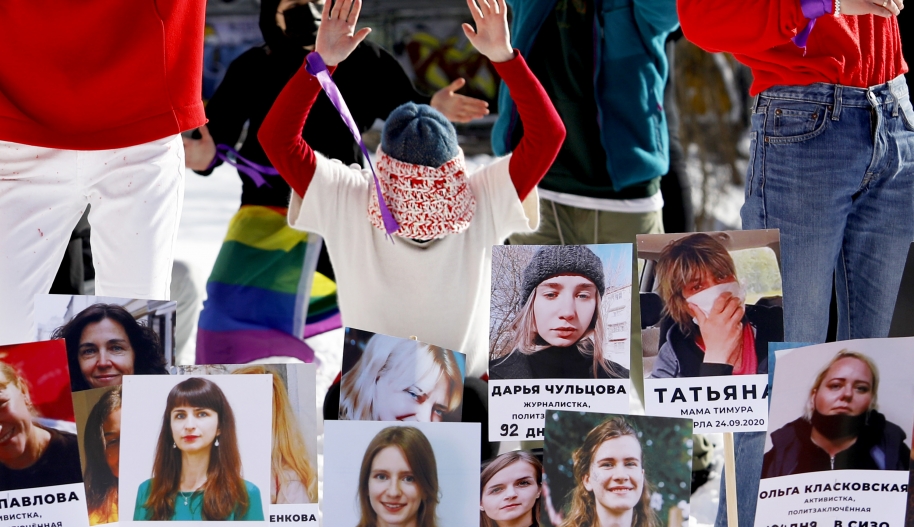Statements made by the Belarusian authorities ahead of demonstrations planned for 25 March (Freedom Day) raise serious concerns that the police response will yet again be marked by severe violence, Amnesty International said today, as it called for international action to protect the rights of peaceful protesters.
As many journalists who document police crackdowns in Belarus have been imprisoned, Amnesty International is calling on diplomatic representatives in the country to monitor the protests and live-stream events, using their diplomatic immunity to expose expected police violence. The organization also calls on all businesses operating in Belarus to conduct urgent human rights due diligence to ensure they do not cause or contribute to human rights violations in the country.
“The authorities in Belarus have indicated clearly enough that they are prepared and have every intention of turning Freedom Day protests into yet another scene of appalling violence if they are confronted with protests similar to last year’s. Over the past eight months, the Belarusian government has presided over a human rights crisis marked by mass arbitrary arrests, imprisonment of journalists, unlawful use of force during protests, and torture and killing of peaceful protesters. The message from the top in Belarus is clear: any exercise of the right to freedom of peaceful assembly or expression will be ruthlessly crushed. The world cannot stand by in the face of these threats,” said Marie Struthers, Amnesty International’s Eastern Europe and Central Asia Director.
“World leaders should urge their diplomatic representatives in Belarus to monitor protests on 25 March and to live-stream events. International representatives can tell the stories for which Belarusian journalists have been imprisoned for sharing. It is essential that the abuses unfolding in Belarus continue to be exposed.
“We also call on international businesses to ensure they do not become involved in any future human rights violations by the Belarusian authorities, by taking concrete action to mitigate any risks. For example, businesses whose services may be used to restrict the free flow of information in Belarus should take steps to effectively prevent such abuses. If telecom companies are unable to prevent internet or mobile coverage shutdown, they should mitigate adverse impacts to the extent possible, for instance by informing users in advance, limiting the duration and geographic spread of the disruption, and finding ways to reduce impact on the most vulnerable and essential services such as hospitals.
“Solidarity with the Belarusian people requires firm, targeted action from the international community.”
Amnesty International is closely monitoring the situation in Belarus. On 25 March Amnesty activists around the world will hold protests outside Belarusian embassies and share messages of solidarity with peaceful protesters.
Background
Thursday 25 March, known as Freedom Day, is an unofficial public holiday marking Belarus’ 1918 declaration of independence. This year, it is expected to be marked with nationwide protests. Svyatlana Tsikhanouskaya, Belarus’s exiled leading opposition figure, has called for global solidarity with Belarusians on this day.
Meanwhile law enforcement and government figures have made alarming statements indicating the possibility of a violent response. Belarus’ Deputy Minister of Internal Affairs Mikalai Karpenkau described the expected protesters as “fascist henchmen” and promised to “deal with them” in a way “already worked out” – a reference to the months-long crackdown which has seen protesters beaten, detained, tortured and arrested en masse. In January, a leaked audio recording appeared to show Karpenkau telling his subordinates to disregard international human rights law when dealing with protesters, condoning shooting protesters in the head and other vital organs with rubber bullets.
On 9 March, the Chair of the State Security Committee (KDB), Ivan Tsertsel, declared during a meeting with President Alyaksandr Lukashenka that “specific persons” are planning actions “to destabilize” the situation in the country on 25 March. Tsertsel also said that “fugitives” and “foreign special services” were behind the planned protests. Starting in late 2020, Tsertsel was quoted in the media promising “harsh” responses to protests in Spring 2021, also stating that the authorities were preparing “for a hot war.”
During the crackdown on peaceful protests that started on 9 August 2020, Belarusian police have used rubber bullets, stun grenades, chemical irritants, water cannons and other less lethal weapons against peaceful protesters, resulting in at least four deaths and countless serious injuries. More than 30,000 demonstrators have been detained and scores of women and men have been subjected to torture and other ill treatment. At least one person is known to have died in detention. To date, criminal proceedings have not been instigated against a single police officer in connection with these alleged violations.













